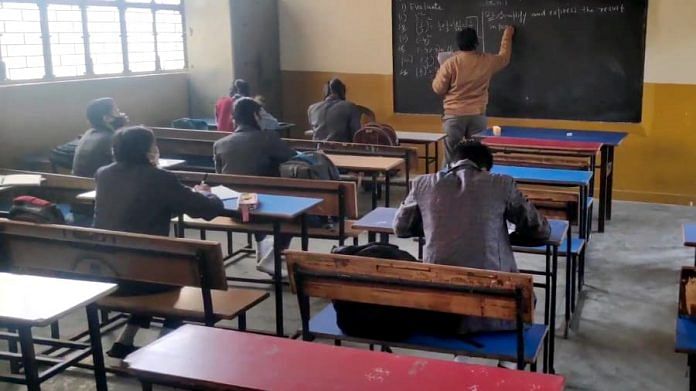
Thank you dear subscribers, we are overwhelmed with your response.
Your Turn is a unique section from ThePrint featuring points of view from its subscribers. If you are a subscriber, have a point of view, please send it to us. If not, do subscribe here: https://theprint.in/
Due to Covid-19, schools have been closed for in-person classes in most of the country since March 2020. The debate with respect to schools and education in India has only revolved around two aspects: whether or not to conduct 10th and 12th standard exams or what should be the fees of private schools for providing online education.
Now that class 10th and 12th CBSE examinations have been cancelled by the central government, people seem to think that the matter is settled. Unfortunately, a discussion on how to safely reopen schools for in-person education during the pandemic has been missing. The lack of debate and planning about reopening schools has shown that our politicians and bureaucrats cannot foresee the repercussions of keeping children out of school for so long.
In other countries, reopening primary schools and keeping them open was the number one concern of central, state and local governments. Many European countries have kept schools open through both the first and second waves of the pandemic with suitable precautions.
Donald Trump recognized the importance of keeping schools open for in-person instruction and kept insisting that US states keep schools open.
Unfortunately, in India there has been no discussion on opening schools or how to provide in- person learning for marginalized sections of society.
Many states in India, have not classified teachers as essential workers and have not made them eligible for vaccinations. Simultaneously, many state governments have made foreign-bound students eligible for free vaccinations, prioritizing the education of foreign-bound students over students staying in India.
The sad reality is that in India, education just means passing an exam, and the pandemic has exposed a hypocrisy: our politicians and bureaucrats claim to value education but also think that passing an examination means that someone has become educated. They have reduced our schools to merely exam-conducting buildings with little value for in-person interactions between peers and teachers.
This attitude is so pervasive that there has not even been any thought about how to engage students in remedial education when schools reopen so that they do not get permanently left behind.
This is especially disastrous for primary school children where in-person interactions between teachers and students is essential for their social and emotional development. Many rural populations do not have access to any digital devices with data plans for online learning. In these areas, many students have lost over 12 months of learning and have fallen permanently behind in their academic development.
These students have not had access to midday meals available via schools, compromising their health and nutrition. In urban areas, students have only had access to online learning, primarily accessed via their parents phones, which is grossly inadequate. There is also a huge burden on parents of young children who have to be physically present when their children are in online classes.
Many parents will find it difficult to return to the workforce if schools continue to remain closed. Older students are also not immune from the negative consequences of purely online classes. They face social isolation, depression and missed interactions with their peers. The benefits that in-person education provides to these students seems to be lost on the government.
Currently, there is a fear being put into the minds of the Indian people via media reports, that the next wave will affect children. There is no scientific evidence that this will happen nor has this happened anywhere else in the world. Unfortunately, this hypothetical scenario will be used as an excuse by our risk-averse bureaucrats to keep schools closed indefinitely.
There are currently no vaccinations available for children under the age of 12 anywhere in the world, and considering the vaccine shortages in India there will not be any vaccines available in India for children for another year. Are we willing to keep schools closed till then? Are we going to wait till cases become zero before we allow schools to reopen? There is no clarity from the government as to what criteria need to be met before reopening schools.
This long closure of schools will have tremendous social and economic consequences for India, now and in the future. Now that many adults and vulnerable seniors are getting vaccinated, the time has come to put in a timeframe to reopen schools and engage in discussions as to how to do it safely and effectively.
We also need to create a plan to help students, who have lost a year of learning to catch-up. Schools should be allowed to physically open via hybrid modes of learning, by routine testing, priority vaccinations for teachers and staff, and even holding teaching sessions outdoors wherever available. Only when schools can reopen fully can we finally put this pandemic behind us and fix the gaps in our children’s education from the past year.
These pieces are being published as they have been received – they have not been edited/fact-checked by ThePrint.

COMMENTS